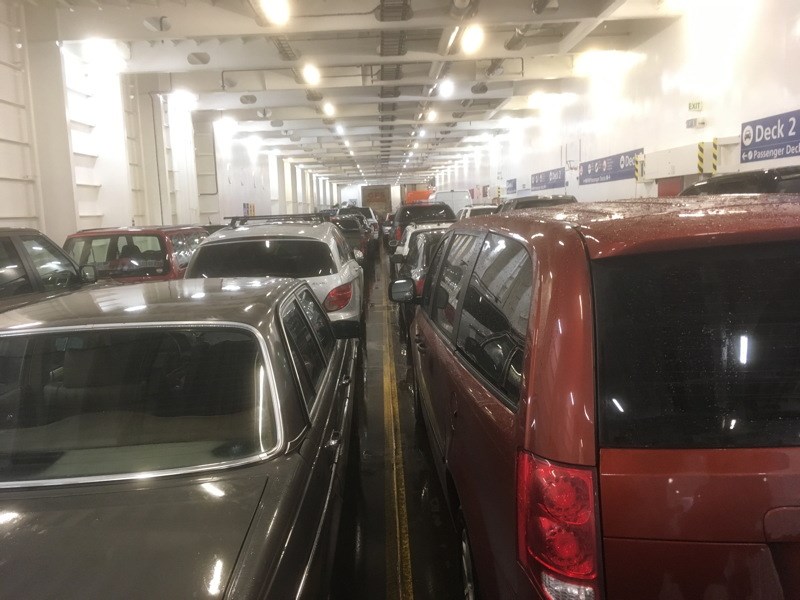Popping down to enclosed vehicle decks on a B.C. Ferries vessel to take a nap or tend to a pet will no longer be allowed as of Oct. 11.
B.C. Ferries announced the measure Tuesday, as well as the decision to make all vessels and terminals smoke-free for staff and passengers as of Jan. 22, 2018.
Restricting deck access is intended to improve safety for passengers and to harmonize B.C. Ferries’ policies with those of other ferry operators and Transport Canada regulations. The Coho ferry, for example, has not allowed passengers on vehicle decks for about 15 years.
The new rule applies to “closed-door, lower car decks,” said Darren Johnston, B.C. Ferries’ director of fleet operations.
The main safety concern is fire and the potential dangers it poses in an enclosed space.
“Every year we have a couple of car-deck fires — lots of hot engines running, you turn off the engine, there’s some leaking fluid,” he said. “In every case in recent history, we detect it very quickly and we extinguish it very quickly, and nobody’s put in harm’s way.”
Use of upper vehicle decks, which have openings to the outdoors, won’t change, Johnston said.
“So anybody’s that’s parked in their vehicle on the upper car deck will be allowed to remain in their vehicle.”
As it stands, Johnston said there are almost always more people using the upper vehicle deck than the lower deck.
“The [lower] car deck is largely full up with commercial vehicles, and they take up a lot more space.”
Johnston said that B.C. Ferries is the only ferry operator in Canada that doesn’t already apply such a lower-deck regulation.
“We’ll be the last ones to go to this extent.”
B.C. Ferries has been complying with Transport Canada rules since 2007 by having such things as continuous patrols on affected decks, he said
“Recently, Transport Canada has done some risk-assessment work and they’ve consulted with B.C. Ferries, and based on all of that they’ve decided to change their application of the regulations and require us to do this.”
Johnston said B.C. Ferries will take a “soft approach” to enforcement, and realizes that some passengers will not be aware of the change right away. “Slowly over time our hope is that this will just become normal.”
He said that if someone turns a request by a crew member into “a security incident,” there is a potential to get the police involved.
Vehicles such as ambulances and livestock carriers will be exempt, while requests to park on the upper deck will be accommodated, when possible.
Plans to alter the use of enclosed decks and to toughen up smoking regulations were both put forward last December by B.C. Ferries. The move to smoke-free is coming during National Non-Smoking Week, and includes medical marijuana and vapour products.
Johnston said revised provincial rules require smokers to be at least six metres away from doors, windows and vents on ferries and at terminals. Because of space limitations, that means vessels must become smoke-free.
B.C. Ferries decided to extend the smoking ban to terminals “to support and health and wellness of our passengers and employees.”
Smoking-cessation options and nicotine-replacement therapy will be offered to employees. The revamped policy will make ferries and terminals “healthier, cleaner and safer environments for everyone,” said Island Health medical-health officer Dr. Dee Hoyano.
Save for the 12-hour sailing from Port Hardy to Prince Rupert, ferry travel is relatively short. “When you think about people flying in airplanes they’re up there for much, much longer in most cases,” Johnston said.
B.C. Ferries will use a similar approach to enforcing its smoking policy as it does to enclosed vehicle deck rules, he said.
“Because the number of people that actually smoke is, I think, less than 15 per cent of the population, there’s already a bit of public pressure.”
A reminder will, hopefully, be enough for someone to stop smoking, Johnson said, but if it turns nasty the crew member involved will back off.
B.C. Ferry and Marine Workers’ Union president Graeme Johnston said the union wants B.C. Ferries to ensure that crew members are not “abused or harassed” by travellers while enforcing the rules.
He said there are some issues with the smoke-free policy. “We still haven’t been consulted on any policy there,” he said. “We’re still waiting to have a consultation with the company about their policy, how they see rolling it out and applying it.”
jwbell@timescolonist.com
- - -
B.C. Ferries’ new policy for enclosed-vehicle decks — not allowing passengers on the decks while sailing — applies to the following vessels:
• Spirit of British Columbia
• Spirit of Vancouver Island
• Coastal Renaissance
• Coastal Inspiration
• Coastal Celebration
• Queen of Alberni
• Queen of Coquitlam
• Queen of Cowichan
• Queen of New Westminster
• Queen of Oak Bay
• Queen of Surrey
• Queen of Nanaimo
• Salish Orca
• Salish Eagle
• Salish Raven
• Northern Expedition
• Northern Adventure
• The new ferry on the Port Hardy-Bella Coola routee



